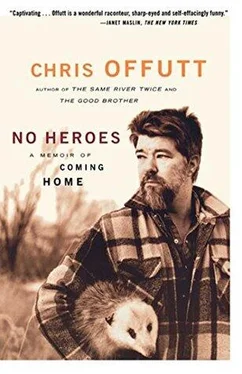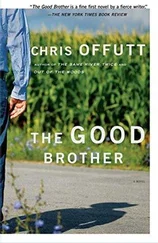As I left the building, two maintenance men emerged from a basement door of the student center. Flecks of dry paint spattered their clothes. They leaned against the wall and lit cigarettes just as I had done twenty years before. The basement door was partially concealed by a wall that rose five feet to street level. It was the ideal hidey-hole, a bunker from which you could spy a boss in plenty of time to return to work.
“Hey boys,” I said. “Working hard?”
“Hidy, Chris,” the younger man said. “Ain’t seen you in a while.”
“Is that Awful Offutt?” the other said. “By God he’s growed, ain’t he. Want a cigarette?”
I shook my head. Men of the hills don’t have the custom of shaking hands or hugging or cheek-kissing. We either beat on each other or look away and mumble. I had known the younger man all my life. Otis was from Haldeman, my home hill of two hundred people.
“How’s your mom and dad?” he said.
“They’re all right. And yours?”
“Same. I see your mom in town, but your daddy don’t hardly leave the house, does he.”
“Not much,” I said.
“What’s he do?”
“You’ll have to ask him.”
The older man was named Billy. We worked together twenty years before, and he had mistakenly believed that I sought the salaried maintenance position he coveted. Billy was my age but looked fifteen years older. His palms were the most heavily callused I’d ever seen.
“Kenny still boss?” I said.
“He died,” Billy said.
“Big Bob?”
“Retired.”
“How about that Johnson?”
“Which one?”
“From up Christy Creek,” I said. “Used to drink a half-pint before lunch.”
“Oh, him. He’s in the state pen.”
“Well, ain’t there nobody still yet there?”
“Me.”
“You must be the boss man now.”
“Naw,” Billy said. His voice took on the angry tone I remembered. “They gave it to somebody else. What are you doing back? Going to court?”
“No, why?”
He lifted his chin in a gesture toward my tie.
“You’re dressed for it.”
“These are my job-hunting clothes.”
Otis grinned at me. Within the contours of his face I saw the child I recalled from our shared time playing in the woods. We knew the secrets of each other’s scars.
“You coming back?” he said.
“Trying to. I got an interview today.”
“Where at?”
“The college.”
“They’re hiring,” Otis said. “I don’t know if you can get on with the painters, but they need movers. You go in there and talk to Amos Riddle. You know any Riddles? They live up on Redbird.”
“It’s not for maintenance, Otis.”
“It’s not.”
“No,” I said. “It’s for teaching. You know, to be a teacher.”
Otis and Billy erupted with laughter, bellowing as if their lives lacked mirth and they were grateful for the joke. When the sound trailed away, they looked at me and I knew they were waiting for the truth.
“I swear, boys,” I said. “I took it up out west.”
“Awful Offutt ain’t changed a bit, has he,” Billy said as he laughed again.
“You should have heard him when he was little,” Otis said. “He told us there was a whale under the grade school.”
“I didn’t know any better.”
“What I want to know,” Billy said, “is who told you they were hiring maintenance men to teach college?”
They began to laugh again, their breath coming hard before shifting to smokers’ rasping. They calmed themselves, glanced at each other, and began to giggle.
“Hey,” Otis said. “Maybe you can put in a word for me. I’d like to be the boss of a girls’ dorm. One of them live-ins.”
“All right,” I said. “How about you, Billy?”
“I’ll take president. Then I can fire you for lying.”
“I ain’t lying, boys.”
“The truth has got to be in him,” Otis said. “Because it ain’t never come out yet.”
“What time is it,” I said. “I got that interview at nine o’clock.”
“Now I know you’re lying,” he said. “It’s five after.”
He showed me his watch, and I hurried away, their laughter hanging in the air like pollen. I understood Billy and Otis’s consternation at my being a teacher. As a student in the seventies, I was usually stoned on marijuana. My work strategy had been to complete my task at a furious speed, then rest until quitting time. Neither Otis nor Billy had any reason to believe I had changed. That any maintenance worker, particularly one with my habits, could become a teacher confirmed all their fears and suspicions about the university. B.A. stood for “Big Asshole,” B.S. stood for “Bull Shit,” and Ph.D. stood for “Piled High and Deep.” At MSU the wisest people worked for maintenance and the stupidest had the most letters after their name.
College teachers were rich, snobby, and dumber in the head than a hog is in the ass. The good one was rare, yet untrustworthy, like a dog that licked your hand but had a history of biting. The administrators were worse — bigwigs who possessed more money than God and were utterly corrupt. They served as further evidence that education was for fools. Part of my coming home was meant to contradict this hill-bred belief.
I crossed the street to the Combs building, a small structure that housed the Departments of English, Philosophy, Foreign Languages, and Theater. The curbs were faded yellow and needed a fresh coat. I faced the reflective glass of the door and adjusted the tie around my neck. No matter how I tried, it wasn’t as good as when Clyde tied it for me and I looked like what I was — a curb painter in a monkey suit.
Inside, I met the head of the search committee moving in that rapid way professors have, legs propelling her forward, one hand digging in a briefcase, the other hand trying to catch a pencil as it fell from behind her ear.
“Sorry I’m late,” she said. “These things never start on time.”
“No problem,” I said. “I was just, you know.”
“Yes, it must be kind of…”
“It sure is.”
“I understand.”
She led me along the hall. A part of me wanted to run away, but this was where I’d run to. The interview was conducted in the same classroom where I’d taken freshman literature twenty years earlier. The floor was now carpeted but the walls were still concrete block. Six people sat in spongy chairs surrounding two wooden tables. I looked at the men in brown jackets and sport shirts, the women in pantsuits, and understood that I was sitting before a table of career academics who found themselves at a lousy school. They lived in an Appalachian town of six thousand with no airport, no bookstore, no deli, no record store, one bar, and forty churches. Everyone but me had a Ph.D. Unlike them, I truly wanted to work at MSU.
My main desire was an opportunity to give back to the community. I knew the difficulties that young people in the hills faced in realizing their ambition of education. My goal was to teach writing in a region where thirty percent of the people were functionally illiterate.
I sat at the table and answered the questions while looking through the window at the basement hidey-hole of Otis and Billy. They had risen to the ranks of salaried maintenance men with intimate knowledge of how to appear industrious — the equivalent of academic tenure. I suddenly wished I was interviewing to work with them. This astounded me to the point of tears, and I heard my voice stop talking. My eyes blinked and the faculty faces blurred. The interview ended slowly, like batteries running down in a mechanical toy. The head of the search committee led me out.
“Good job,” she said. “You clinched it when you got choked up. We’re not used to seeing someone care about teaching that much.”
Читать дальше












